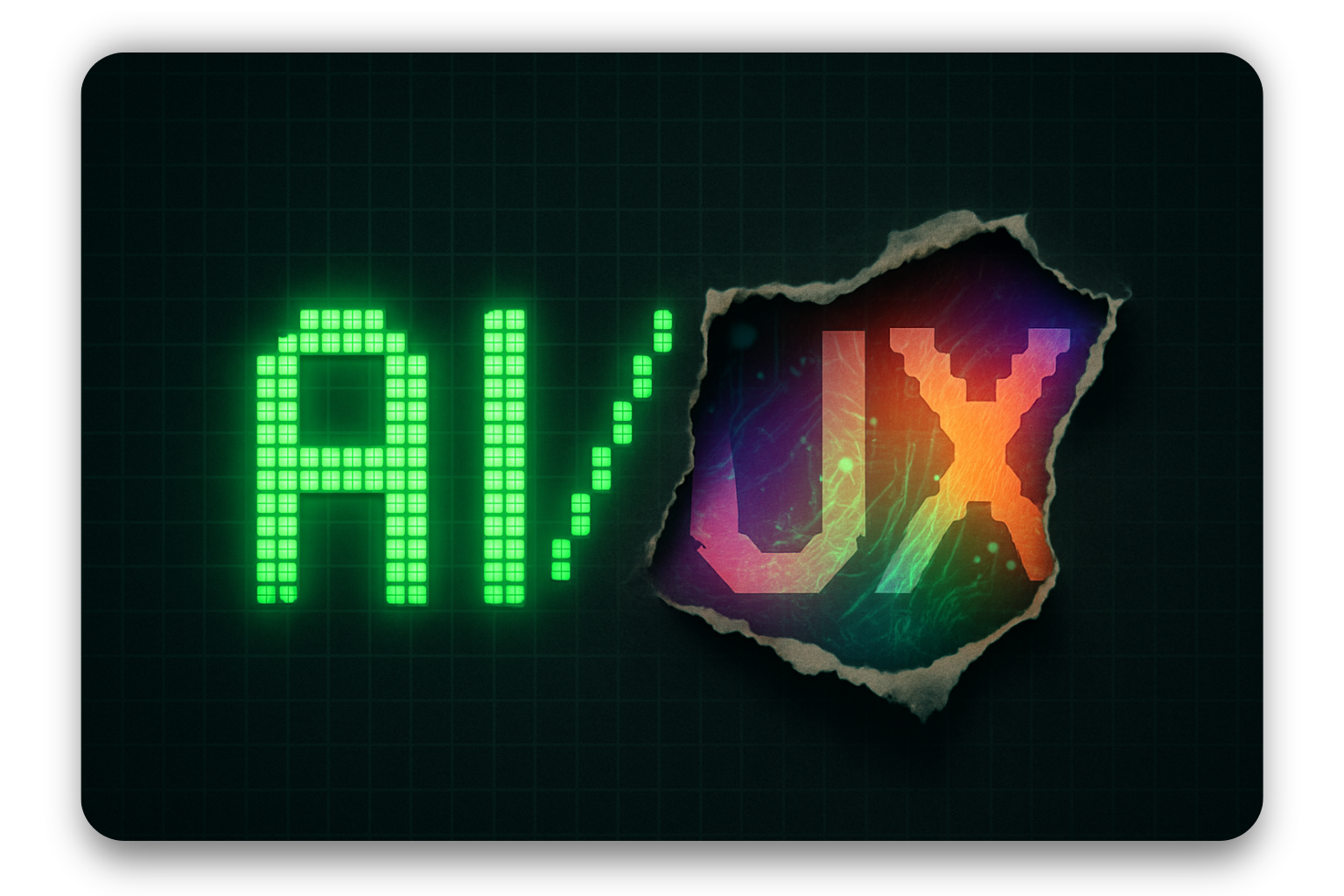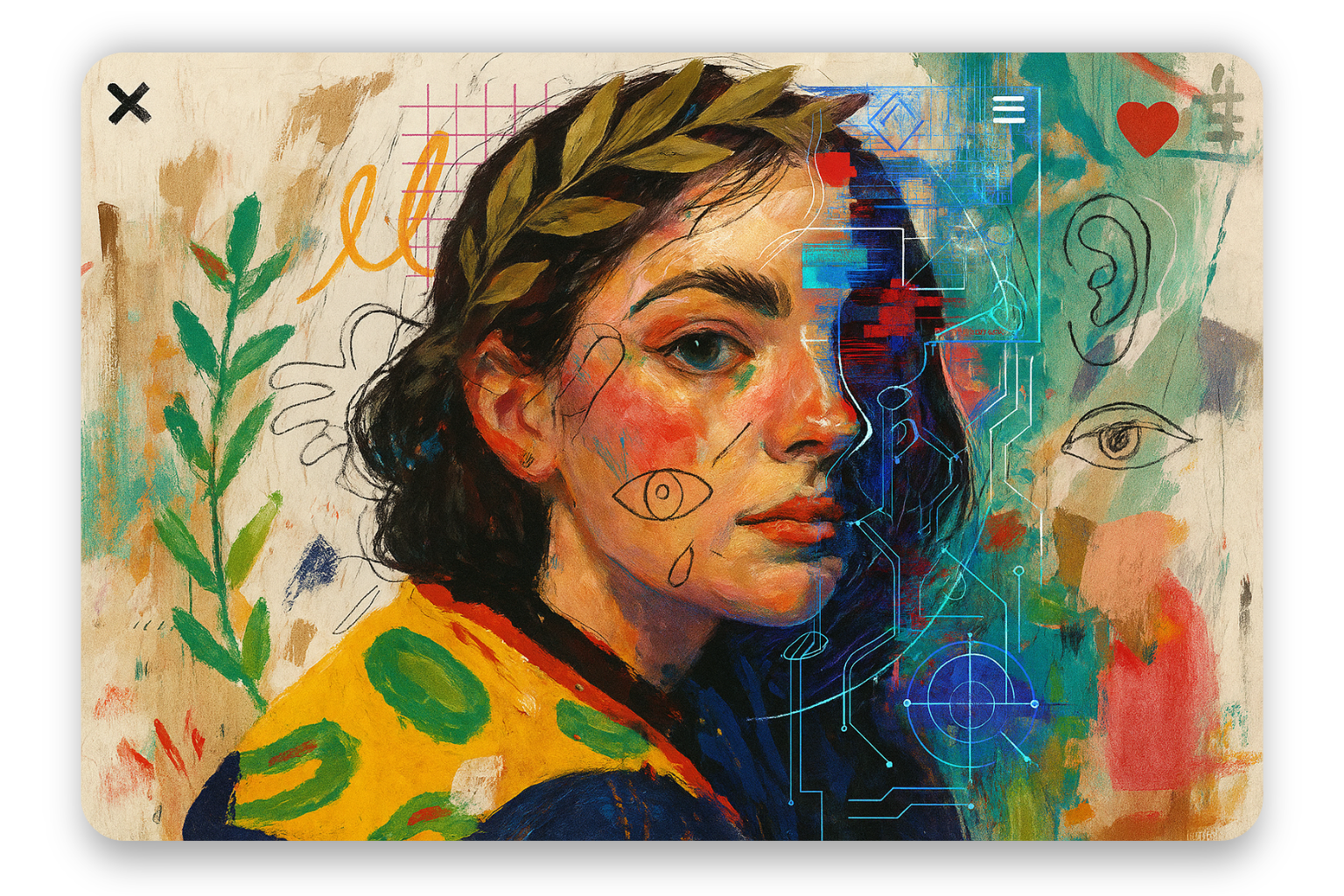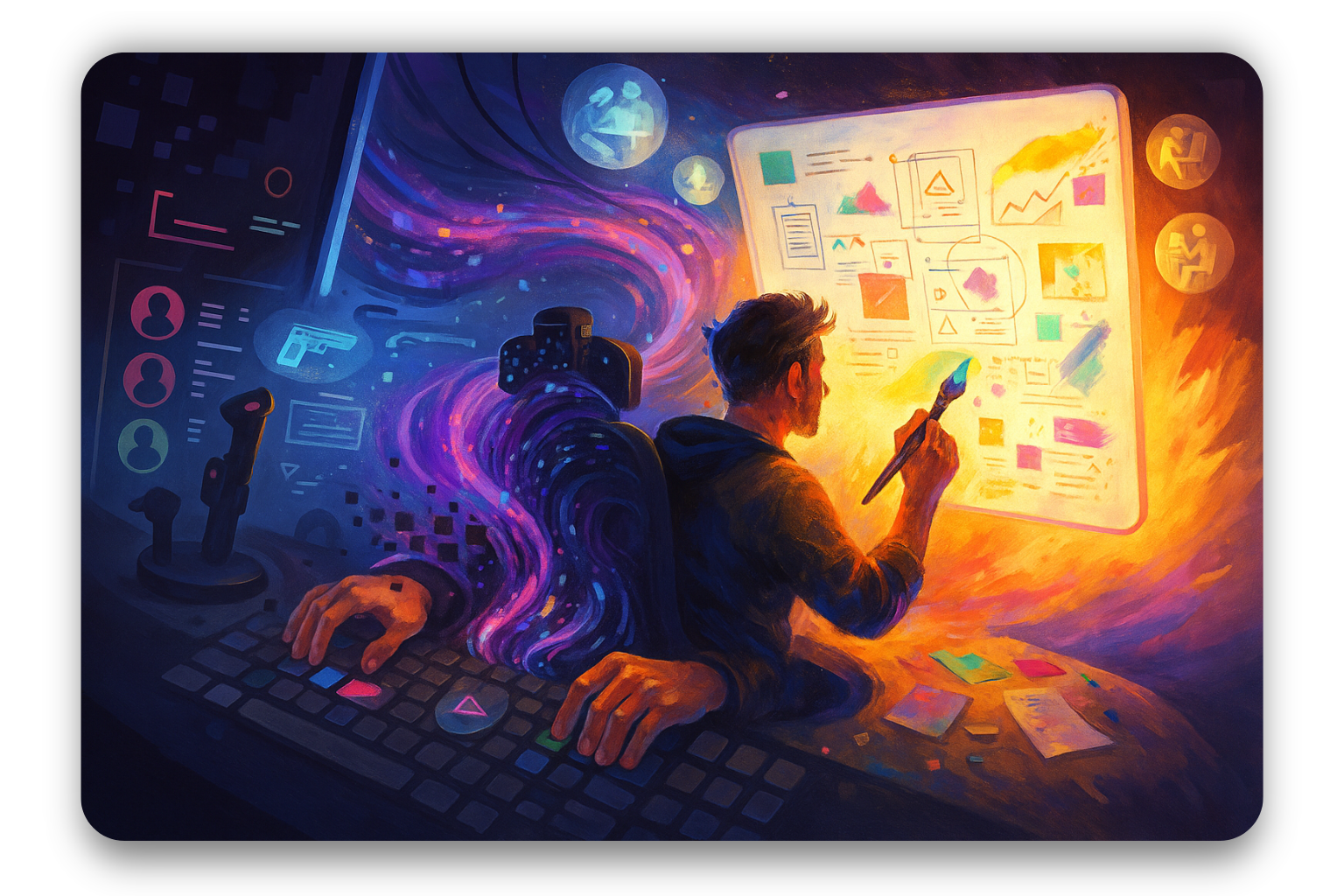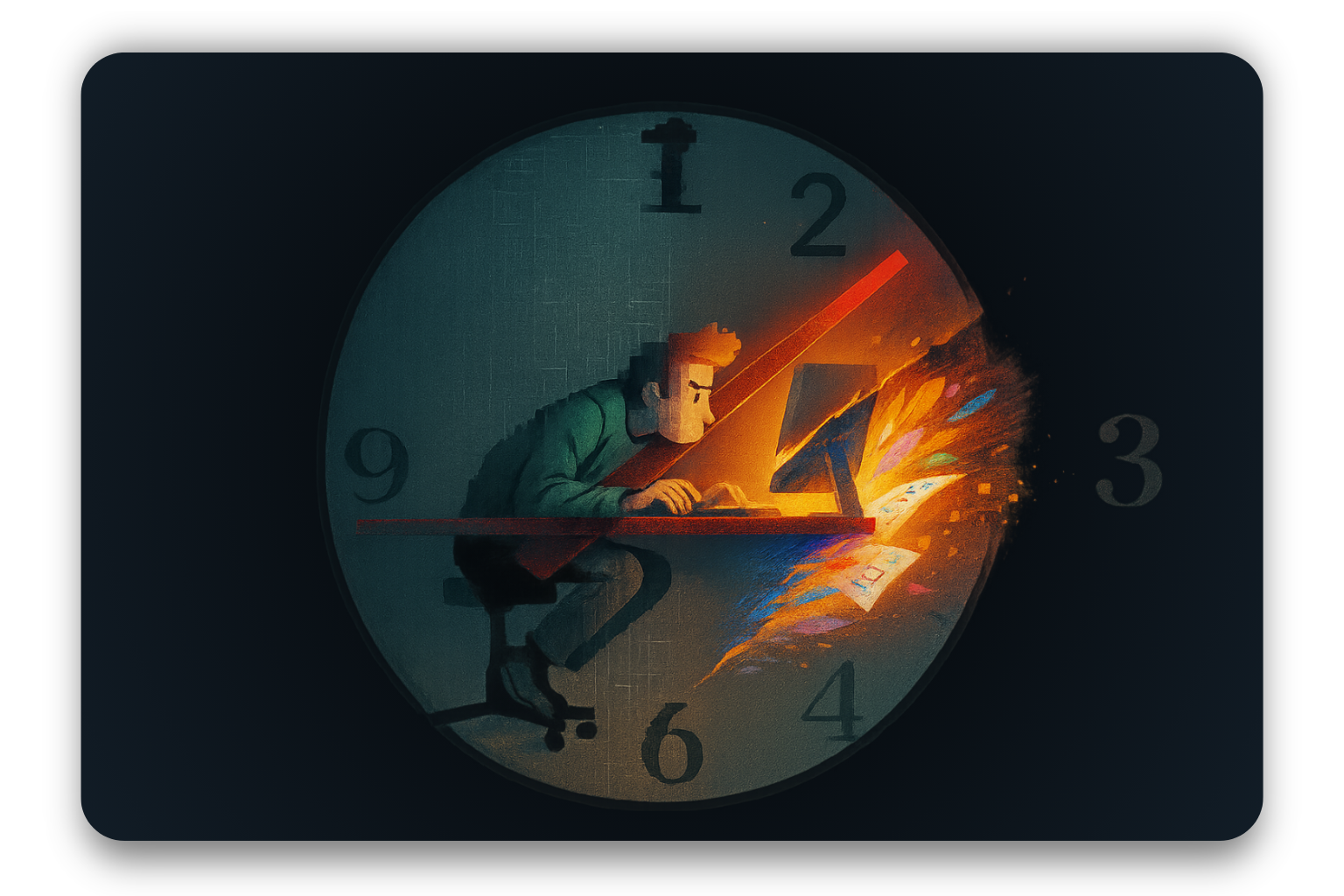Last updated on August 2, 2025
Go back in time. Find a designer in 1999.
They are masters of their craft. Kings of QuarkXPress, wizards of print, fluent in a language of picas and Pantone chips. They are safe. They are secure. And they are utterly oblivious to the meteor called “the internet” that is about to turn them into a fossil.
We are standing in that exact same spot today. We are polishing our component libraries and debating shades of grey, convinced of our own relevance, while a meteor a thousand times bigger and a million times faster hurtles towards us.
AI isn’t coming for design someday; it’s already here, rewriting what good User Experience (UX) means, what your job looks like, and what survives.
Ready or not, you’re designing in a new reality now.
The Deafening Noise Machine and Its Pathetic, Central Lie
Just for a second, stop doom-scrolling the latest “AI is coming for your design job” thread.
Listen. You are being fire-hosed with this noise every single day. The internet has become a digital circus of AI evangelists, doomsaying prophets, and LinkedIn gurus, all screaming at each other and all screaming at you.
One side is selling you a silicon utopia of push-button perfection “One Prompt and Your Job is Done.” The other is selling you a grim dystopia of robotic replacement “AI Will Take All Designer Jobs.”
They are all feeding you the same boring, uninspired, and utterly contemptible lie: that your fight is with the machine.
Design is dead!
You’ll be replaced by a prompt!
Authenticity is over!
Just learn these 10 AI tools and you’ll be a god!
…Yada yada. It’s a fantastic story. It’s also complete garbage.
It’s a cacophony of fear and hype designed to do one thing: keep you paralyzed. Confused. It’s a smokescreen. While you’re busy doom-scrolling and arguing in comment sections, the real future is being built in a room somewhere, and you’re not in there — yet.
Misconception of AI vs. Designer
The “AI vs. Designer” narrative is a failure of imagination. It’s a cheap horror story designed to make you feel small, helpless, and obsolete. Why? Because fear is profitable. Fear gets clicks. It sells overpriced courses and empty promises. Fear keeps you frozen while braver designers are out there actually building the future.
You have to be in that room. You know you should be too.
Let’s be brutally, painfully honest for a moment. If your entire job as a User Experience professional (the sum total of your value) can be replaced by a single line of text in a prompt, then you weren’t a designer. You were a human script. A biological patch for a workflow that was screaming to be automated.
The AI isn’t killing your job; it’s killing the drudgery that you mistook for a career.
Your real job was never about the flawless execution of a wireframe. It was never your mastery of auto-layout. Your real job (the one the machine can never touch) has always been about TASTE. Your STRATEGY. Your COURAGE to have a strong, defensible point of view. It’s the god-given intuition to understand what a user truly needs, even when they themselves cannot articulate it.
The AI can generate a million options. A million soulless, statistically probable mashups of things that already exist. It cannot, and will not, have a singular, brilliant, forward-thinking idea. It cannot have taste. And that is your sacred ground.
A No-Nonsense Guide. This Is What You Do NOW.
Okay, enough philosophy. You wanna know what to do right after reading this? Yes, this might be just your “helpful tips” list, but this is how you’ll thrive in your user experience field.
Know Your How-To Prompt
Your most powerful design tool is no longer Figma; it’s the English language. A prompt is not a search query; it’s a creative brief, technical spec rolled into one. Learn to define not just the what, but the who: the tone, the persona, the constraints, the forbidden words, the desired emotional state. Your words are the puppet strings. Master them, or you’re just another spectator.
Build At The Speed Of Thought
Your old design process is out of the picture now. It’s too slow. A week-long design sprint is a lifetime in this new era. You need to go from idea to testable concept in minutes. Use AI to generate twenty different UI directions in an hour. To write the code for your prototypes. And to create five distinct user personas with detailed backstories before your coffee gets cold. Stop perfecting and start producing. The goal is no longer a flawless artifact; it’s a high volume of smart, visceral experiments.
Become The Ghost In The Machine
The most critical work is no longer on the screen but behind it. You must start creating the new deliverables of the AI age. Design AI Personality Guides that define its character. Write Ethical Guardrail Documents that serve as its conscience. Build Behavioral Blueprints that choreograph how it responds to human emotion—frustration, joy, confusion. Keep in mind the interface as well as the being on the other side of it.
Making AI/UX Make Sense
You can only make sense of AI/UX by understanding what it does to the user experience.
The point isn’t to plug AI into your old process and call it done. You have to unlearn the comfortable drudge work that’s about to vanish and rebuild your instincts around what the machine can’t do.
Here’s how it’s used. This is what AI/UX means now:
For Research
You used to spend weeks sifting through user interviews and survey data. That’s over. Now, you feed the AI hundreds of pages of raw transcripts and tell it: “Brutalize this data. Find the hidden patterns, the unspoken frustrations, the core human needs that our users can’t even articulate.” The AI becomes your team of junior researchers, synthesizing oceans of data into raw, actionable insight at impossible speeds.
For Ideation
“I’m out of ideas” is no longer an excuse. It’s a sign of incompetence. There’s now have an infinite idea cannon at your disposal. You don’t ask it for “a screen for a music app.” You command it: “Generate twenty radical, never-before-seen interface concepts for discovering music, based on the aesthetic of brutalist architecture and the emotional feeling of nostalgia.” It will unleash a tsunami of concepts. Some mediocre, some genius.
For Prototyping & Production
The gap between idea and reality has collapsed to zero. Your week-long sprint is now a 30-minute coffee break. You sketch a wireframe on a napkin, take a photo, and tell the AI: “Build this. Make it a functional prototype. Use our design system. Write the code.” The AI becomes your tireless production artist, your front-end developer, your component builder. It liberates you from the tedious work of pushing pixels and wrestling with code so you can focus entirely on the quality of the idea and the experience.
For Content
“Lorem Ipsum” is a fireable offense. You don’t need placeholder text when you can prompt the AI: “Write the microcopy for this onboarding flow. The user is anxious and skeptical. Make the tone reassuring, witty, and incredibly clear. Give me five options for every button.” The AI becomes your in-house copywriter, but you are its editor-in-chief. You guide its voice, sharpen its message, and ensure the words on the screen have as much intentionality as the pixels.
Making AI/UX make sense is accepting this new reality: The AI does the work. You do the thinking. It handles the “how” at a scale and speed you cannot comprehend, freeing you entirely to focus on the “what” and, most importantly, the “WHY.”
Pretty handy now, right?
The Real Urgency On User Experience
Remember the ’90s? When the User Experience discipline was largely absent as engineers and advertisers laid the chaotic foundation of the web? We spent the next decade paying off the “usability debt” and cleaning up the mess of unusable interfaces they left behind.
It’s happening again. This time, the “debt” we are accumulating by being absent from the core conversations will not be measured in confusing interfaces, but in biased, autonomous systems, and ethical failures built without human-centered oversight.
The urgency is not the threat of being replaced by a machine.
It’s the urgency of being replaced by another designer who isn’t afraid of the machine.
The ghost of 1999 is laughing at you, not because a robot will take your job, but because a braver human will. The threat is the designer sitting next to you who is already using AI as a creative accelerant. The one producing better ideas, faster. The one spending their time on high-level strategy and ethical orchestration while you’re still manually resizing buttons.
That is the survival instinct you should be feeling. That is the real AI/UX urgency.
Final Thoughts
The ghost of 1999 wasn’t a warning. It was a mirror.
In it, you see the competitor who didn’t wait. The one who started building while you were still stuck debating.
“But I have integrity for my natural talent.”
…Oh shut up. It’s called “natural” for a reason. It’s innate!
The future is being designed right now, with or without you.
Will it be you? Will it be by you?
Your choice: design, or be designed.






















